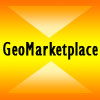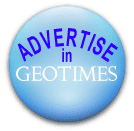|
Web Extra Wednesday, March 28, 2007
OneGeology: A site for all
Perhaps no one knows better than geologists how national
boundaries conflict with science. So in partnership with the United Nations'
International Year of Planet Earth, geologists around the
world are coming together to form a world geological map, accessible to all
on the Internet. The project is called OneGeology, and
earlier this month geologists from 43 nations and 53 national and international
bodies met in Brighton, England, and agreed to an accord that outlines their
strategy.
The brainchild of geologist Ian Jackson of the British Geological Survey, the
project will be comparable to Google Earth, and perhaps even offered through
the dynamic map program. What will be different, he says, is the wealth of information
it will provide. "It will not be an atlas, but a system on the Web for
users," says Edward Derbyshire of the University of London and chair of
the Science Programme Committee of the International Year of Planet Earth (see
Geotimes, January 2007).
The map will be at a scale of 1:1,000,000, meaning it will show any feature
a kilometer in size or larger, a scale that participants agreed was the most
manageable to begin with, and would allow all countries of the world to participate.
As this project continues, the scale will reduce to a more detailed 1:100,000,
which will show features about the size of one street block.
The original goal of the project was to provide easy access to information that
was already out there, Jackson says. Traditionally, geological data has not
been easily exchangeable across countries. "I don't think people appreciate
how much knowledge is out there," he says.
The program is a collection of data strung together by one programming language
that allows individual geological surveys and other research bodies, such as
polar and marine surveys, to upload their own data to the dynamic geologic map
as frequently as they want. The map will thus reflect the most up-to-date data
each participating body has.
By producing a geological world map, the participants of OneGeology hope to
create a geological standard, allowing lithologies and stratigraphies, for example,
to be easily understood from one nation to another. By providing a harmonious
dataset across countries and continents, nations around the world will have
access to information they have never had before, Jackson says. "We want
… people around Earth to know about the resources that will become available,"
says Harvey Thorleifson, director of the Minnesota Geological Survey.
Research in the geosciences will be aided by having ready access to the information
provided by the global geological map. One of the benefits of such a standard
would be the ease of identifying deep geological structures that might be used
for the safe long-term storage of carbon dioxide, Jackson says.
But the map can also benefit other fields such as engineering. For example,
engineers constructing a pipeline can look at the OneGeology map to find information
on bedrock structures that span national boundaries. The map could also help
spot potential problems between nations before they flared into conflict, researchers
suggest. Other unexpected applications include groundwater and pollution tracking
between countries.
"We realized at the meeting how big this is. I mean, holy smokes!"
Thorleifson adds. The size of the project, and the willingness of so many national
bodies to participate, is terrific, researchers say. And it's only the beginning,
as the project just kicked off this spring.
"Earth is the only place we've got, and we'd better use it wisely,"
says Aubrey Manning, a zoologist at the University of Edinburgh. And this site,
he says, is going to help us do that.
Links:
OneGeology
International
Year of Planet Earth
"International
Collaboration in Global Science: Price or Prize?" Geotimes,
January 2007

 Subscribe
Subscribe


